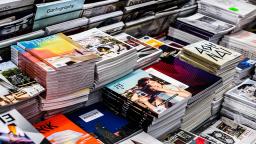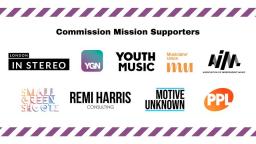
On the cusp of historical change in 2020, cultural commentators will still be here to say their bit.
Written by James Balmont - as part of Commission Mission.
The coronavirus pandemic has hit the music industry hard, and with that, music publications have, too, taken a hefty hit. With limited opportunities available for music writers in June 2020, the immediate future might feel bleak.
But the industry has a surprising knack for fortitude. Like a skipping record, "the end of music journalism" has been forecast ever since the origins of pop criticism in the '60s. Music writing has, instead, reinvented itself at every major juncture, remaining a vital cog in the music industry's ever-changing machine to this day.
So here's a hot take from Dr. Simon Morrison, Programme Leader of Music Journalism at the University of Chester, from earlier this year: "it's actually quite a vibrant time to be a music journalist".
I couldn't agree more. Some of the most vital movements in popular music have been the result of economic struggle, political upheavals and social marginalisation. And on the cusp of historical change in 2020, cultural commentators will still be here to say their bit.
But the question remains: how does one prepare for a career in music journalism, when nobody yet seems quite sure of what form it will take? The way I see it now is the time to look inwards - knuckle down, and do what you can so that you come out fighting on the other side.
I'm lucky to have had plenty of guidance passed down unto me across eight years of freelance music writing, and it is through this inherited wisdom that I can share my advice. Through the support I have fostered, I've managed to overcome all manner of setbacks, disenchantment and uncertainty. And through persevering with these practices, aspiring writers will be able to strive throughout 2020, and beyond.

1. Read
Consuming a broad range of material is valuable for teaching the language of writing. Writing about music depends on having a passion and knowledge for the subject, but it should be informed by your range of reading as much as the diversity of your record collection.
We are introduced to all manner of written constructs that implicitly teach us about storytelling from a young age. These range from tone, cadence and syntax, to pathos, rhetoric and composition. As Professor of English and author Joe Moran described it in 'How to Write Good Sentences', the best sentences have a music, a sound and a rhythm to them. It is the combination of these elements that makes reading them enjoyable.
So read fiction novels, read rock biographies, read contrasting opinions, and read controversial interviews. Understand how different kinds of literature work, and learn what makes them different. Work out which writers you like, and work out what you like about them, and then use that knowledge to inform your own writing.
Read about writing, too. George Orwell's 1946 essay 'Why I Write' remains a fascinating insight into the creative process, while Lester Bangs's pioneering gonzo journalism of the '70s is essential for understanding how music criticism has evolved over the years.
Lastly, read the pitching guidelines that are offered by some publications, so that you can adapt your writing to fit DJ Mag as well as The Guardian.
2. Establish A Support Network
I once attended a seminar hosted by The Quietus editor Luke Turner, where he advised that to be a music journalist you need to have a thick skin - because you need to get used to rejection.
The next day, empowered and full of confidence, I pitched a feature to The Guardian that went completely unacknowledged. Mortified, I didn't send off another pitch - to any publication - for months. At that early stage of my career, I wasn't mentally ready to deal with the fact that in order to succeed, I was going to have to get used to a few knock-backs.
As i-D Magazine Junior Editor Róisín Lanigan put it in a June 2020 post, "Dealing with rejection is probably the shittiest part of being a writer."
This is why it is so important to have a support network. Picking yourself up isn't easy if you've got no-one to spur you on, or, indeed, if you're stuck in quarantine during a global pandemic. Fortunately, even for the most introverted among us, networks of music writers exist around every corner, from Reddit communities and Twitter circles to the NUJ.
All writers suffer from impostor syndrome (a persistent sense of unworthiness or self-doubt) at some point, so never be afraid to compliment someone on their work. It's a great way to break the ice, make someone's day, and build a relationship. The writing community is a surprisingly supportive place as soon as you realise that everyone shares the same difficulties that you face.
3. Empower Yourself
Confidence and determination don't come easy in a world plagued with anxiety, but you do need to find some strength from within you if you want to thrive as a music journalist.
Julio Vincent's e-book ‘Freelance Heaven: 100 Ways To Make Freelance Life Easier and Avoid Freelance Hell’ offers some tips on how you can transform your vocabulary to revolutionise your perception of yourself. Some essential points to consider include:
-
You are not trying to be a music journalist; you are managing, directing and running your own business.
-
Editors aren't your bosses; they are your colleagues. Writing is a collaborative process, so take pride in the fact that you're working together to make your work the best it can be.
-
Publications aren't your employers; they are your clients. You are selling them a service, and they are paying you for it.
The subject of payment and compensation for writing is complex, but it is generally agreed that you should never offer to work for free. Instead, enquire about a publication's pay structures at the first available opportunity, and decide whether you want to work for the rate offered.
Be compassionate, but don't sell yourself short. The way you frame the value of your work will ultimately shape your confidence and motivate you to improve and succeed.
4. Build A Database Of Resources
A strong sense of organisation is essential for any aspiring music writer. It's a fickle industry that is destined to evolve around you, so you will need a secure base to ground yourself as you venture out into bold new places in your career.
Since we've established that you are an independent business, you may as well act like one. Build a centralised database or master document to keep track of your contacts and resources. This will grow over time and eventually become your music journalism Bible.
I use Google Sheets to keep track of:
-
Contact details for editorial staff at publications I'd like to write for; so I can easily reach out to the right person if I have an idea.
-
Contact details for staff at PR companies; so that I know who to contact if I need to speak to an artist, request access to music, or source a press release.
-
My ideas, pitches and commissioned pieces of work; so that I know what I'm working on and what I've got coming up.
-
Release dates for albums, gigs and other cultural events that might serve as a good angle for a feature proposal.
-
A dated list of my invoices; so I don't forget to get paid.
In addition to this, get connected with publications, staff and contributors on social media so that you have a constant stream of news, advice and opportunities coming directly to you.
Editors, for example, will periodically announce that they are looking for freelance pitches on their Twitter accounts, while newsletters, podcasts and websites provide constant updates to help you navigate the field.
Some good examples include Todd L. Burns' Music Journalism Insider, a weekly e-publication that curates media highlights, job opportunities and other essential advice, and Anna Codrea-Rado and Tiffany Philippou's podcast Is This Working?, which explores the myths and struggles of working independently. Journo Resources, meanwhile, is a catch-all website offering advice and support for people working in the journalism industry.
5. Plan Ahead, Prepare Your Pitches And Write
Consider some short- and long-term goals. What would you like to achieve as a music journalist this year? Is it seeing your name in print in a publication you care about? Getting to speak to an artist you admire? Or the gratification of actually getting paid for your creative work?
Tick those things off when you achieve them. Share those achievements, and celebrate them. It's easy to lose track of the progress you have made if you're always looking up, and when you are starting out it is important to value your progress as you grow as a person and as a business.
Like reading, it is important to practice your writing as much as possible; research means little if you don't put it into practice. You don't need to write an essay every day, but consider keeping a personal journal, and a notebook to jot down your ideas.
And write pitches whenever you get a burst of inspiration (plan weeks, and months ahead!). Keeping your writing varied is essential practice, and will help you cultivate your own personal style.
You don't need to sit around waiting for a magazine or website to commission you, either. Some of my favourite examples of music journalism come from self-published authors: Love Letters Zine is an independent print publication dedicated to women and non-binary figures in music, while One Great Song is an indie blog based in the North West that harks back to the blogosphere of the early 2010s.
The Forty-Five, meanwhile, is a recently-established all-female online publication headed up by former NME editor Charlie Gunn that is supported by monthly Patreon subscriptions.
Self-publishing is often the first step in a music journalist's career. Why not get creative, and start an Instagram account, or a WhatsApp group, or a zine? There's no time like the present to start making a name for yourself.
---
Commission Mission was created by Young Guns Network and London In Stereo to commission 20 new and experienced freelance writers to create articles to inspire, inform and entertain young people in the music industry who are struggling during Covid-19.
The supporters who made this project possible were Association of Independent Music, London In Stereo, Musicians Union, Motive Unknown, PPL, Remi Harris Consulting, Small Green Shoots, Young Guns Network, Youth Music.

